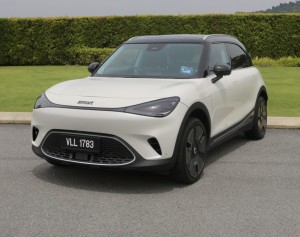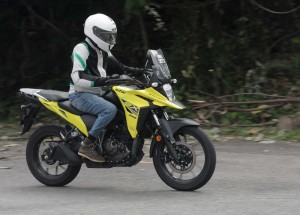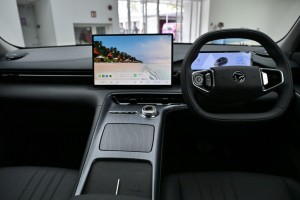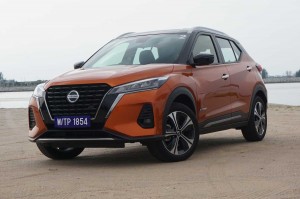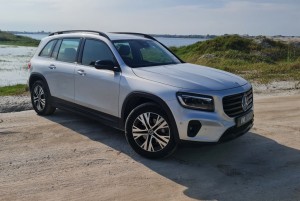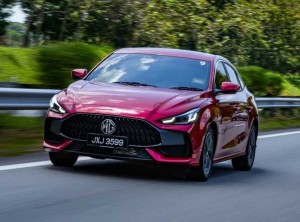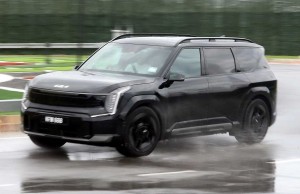NEW YORK: When Eren Canarslan, the co-founder and chief executive officer of Olympian Motors, removes the car cover from one of his company’s prototypes on a rainy fall day in Brooklyn, the most striking first impression is that it’s, well, cute.
The two-door coupe, dubbed the Model 01, has distinctly vintage vibes, with smooth curved lines, swoopy Art Deco finishes and a front end so friendly it seems to smile.
It looks more like a set piece from a classic movie than a car you’d take to the McDonald’s Drive Thru.
In an automobile landscape where cars seem to grow ever larger and more visually aggressive, Olympian, whose first vehicles are now available for pre-order, is leaning heavily in the opposite direction.
Its cars are designed not to intimidate but to delight, and the company is hoping to both rebrand luxury for drivers and produce an electric vehicle that can turn a profit.

"For us, climate is luxury. For us, silence is luxury,” Canarslan says. "Luxury means a company that respects the environment. Luxury means a company that is respectful to the city.”
Founded in 2021, Olympian Motors is the outgrowth of an idea Canarslan developed with his fellow co-founder, Jasmine Sungu.
The two connected in 2019 over a shared belief that traditional automakers were trapped in century-old thinking that was increasingly disconnected from intuitive design and customers’ actual needs.
While car reviews are often dominated by horsepower, torque and acceleration speed, Olympian’s surveys of roughly 2,000 people across the US found that only a small percentage actually cared about those things.
"They said that as long as the performance is within the industry average, we’re good,” Sungu says.
What consumers did crave was comfort and simplicity, and a car both technologically advanced and aesthetically pleasing. So the duo decided to focus their designs on vehicles for ordinary people, not gearheads.
Olympian’s Model 01 and its Model 84, which looks like a road-ready dune buggy, are the company’s first attempts.

Both the Model 01 and the Model 84 will come in two- and four-door versions, with ranges and battery capacities that are on par with much of their electric-car competition.
But unlike many other EVs, which tend to have souped-up touch screens that span the entirety of their dashboards, the Model 01 and Model 84 have none.
Instead, Olympian leans into old-school controls: numbered dials for the speedometer, tachometer and battery indicator, plus a single knob for climate control. (Drivers will be able to connect their smartphone to the car for functions like streaming music and a backup camera.)
The company says its cars have 80% fewer buttons and switches than a typical driver cockpit.
"Often when I’m driving, I’m not looking at the road. I’m looking at the screen and it’s distracting,” says Canarslan, who notes that respondents to the company’s surveys said that after a long day they’re often sick of staring at screens.
Next year, the company is hoping to roll out an augmented-reality windshield display that would provide turn-by-turn directions while letting the driver keep their eyes on the road.
The dashboard doesn’t only stand out for its lack of centre-console touchscreens; it’s also made out of wood.

Olympian says its wood suppliers are all certified by either the Forest Stewardship Council, the Programme for the Endorsement of Forest Certification or both.
"One of Olympian’s values is we want to bring back the pleasure of driving,” Sungu says.
"When you’re surrounded by plastic and unnatural materials, you actually biologically can’t relax.”
To maintain its aesthetics while streamlining manufacturing, Olympian uses a modular approach that it says reduces tooling, machinery and labor costs by 75-80% and production lead time by 60% compared to the construction-line approach of legacy US automakers.
This Lego-like method simplifies manufacturing to a combination of components - platform chassis, battery, windshield, etc. While most car companies do this to some extent, the approach is suited to EVs, which have fewer moving parts.
Olympian says the final assembly process that it handles only comprises about 30 pieces, with plenty of redundancy. (The Model 01 and Model 84 share a platform chassis, for example.)
To offer a variety of colours, the company will rely on pre-painted panels.

While the modular approach is well-suited to quickly starting and scaling a car company, it presents its own challenges.
For one, suppliers often prioritize larger auto companies with bigger orders.
"If GM signs a partnership with LG, LG is going to be producing for GM first,” says BloombergNEF analyst Corey Cantor. "Only after GM are they willing to be free players.”
For now, Olympian’s anticipated production capacity is nowhere near that of its competition.
The company says it has received more than 350 pre-orders from US customers (including a refundable US$500 deposit) for the Model 01; to hit positive cash flow Canarslan says they would need to sell 200 cars per year.
Tesla, by comparison, delivered 485,000 EVs in the fourth quarter alone, and even EV upstart Rivian made 57,000 cars in 2023.
The Model 01 isn’t cheap, either: Both the two- and four-door models will go on sale for US$80,000 (RM378,000), on par with a Tesla Model X and a touch above the cost of a Mercedes EQE SUV.

"That’s a higher-end market,” Cantor says.
The tension between a car’s cost and its capabilities - and carmakers’ ability to scale production - has taken center stage in the EV transition.
After soaring by 62% in 2022 and 31% last year, global EV sales growth is expected to slow to 21% this year, according to BloombergNEF.
Ford, General Motors and Volkswagen have all trimmed output of electric models or walked back production goals. Consumers, meanwhile, are contending with a dearth of affordable options as automakers prioritize higher-priced cars.
Olympian joins a slate of domestic EV startups, including Rivian and Lucid, that are still struggling to reach profitability.
"If you’re competing with the big guys, there’s a real challenge for startups,” Cantor says. "If you’re GM, you can sell more gas cars to fund the transition. If you’re a startup, it’s sink or swim based on your product. So from that standpoint, I think a lot of the startups that are around now won’t necessarily be here in 10 years.”
In 2021, Olympian received US$125,000 in seed-stage funding from Y Combinator and participated in its startup accelerator program, which helped launch companies like DoorDash and Airbnb.
It has since gone through three funding rounds, the last in 2023. Canarslan says the company can stand out on its customization and driver experience. "Some people pay US$200,000 for a Porsche,” he says.

"We want to be more affordable high-end.”
EV growing pains notwithstanding, transitioning from internal combustion to electric drivetrains is essential for reaching net zero: Transportation accounts for 24% of total carbon emissions, according to the International Energy Agency, and road vehicles are responsible for 70% of that.
But research shows that, ideally, there should also be a reduction in the overall number of cars on the road and miles driven.
In that sense, Brooklyn is an interesting place to headquarter an EV startup, as New York City has some of the best mass transit in the US.
Olympian’s location is in part a historical nod: A century ago, the city was a hub of custom car manufacturing, including electric vehicles.
The Brooklyn Navy Yard, where Olympian is located, is also home to a number of green startups, and Olympian is betting that even NYC has a need for light, stylish electric cars. Sungu points to the rollout of curbside charging across the five boroughs.
"Yes, they want to increase foot traffic and reduce the footprint of congestion cars,” she says. "But I think there’s still room for us to play in cities.”


